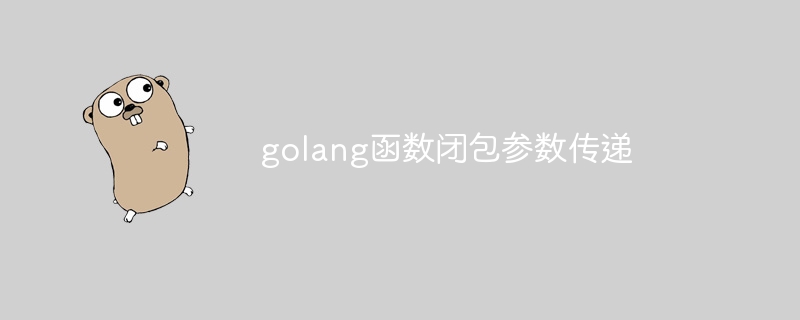
In Go language, closures can pass parameter values or references. Passing a value creates a copy of the value in the closure, and changes to that copy are only effective within the closure and do not affect the original parameter; passing a reference creates a pointer to the parameter in the closure, and changes to the pointer Update original parameters. When a parameter is passed by value, the value of the original parameter remains unchanged, whereas when a parameter is passed by reference, the value of the original parameter is modified.

Parameter passing in Go function closure
Introduction
In Go In the language, a closure is a function whose scope contains the scope of its creating function. This allows the closure to access and modify variables declared in the creating function, even after the creating function returns.
Parameter passing
When passing parameters in a closure, you need to consider whether the passed parameter is a value or a reference.
Practical example
The following example demonstrates how to use closures to pass parameters and modify external variables:
package main
import "fmt"
func main() {
// 声明一个外层函数并传递一个值
counter := func(num int) {
num++ // 对参数的值进行修改
fmt.Println("Value in closure:", num)
}
// 调用外层函数,传递一个值
num := 10
counter(num)
fmt.Println("Value outside closure:", num) // 值不会改变
}Output:
Value in closure: 11 Value outside closure: 10
In this example, counter is a closure that modifies the value of num. However, since num is passed by value, modifications to num are limited to the closure, while the outer variable num remains unchanged.
Passing by reference
To pass parameters by reference, you can use pointers:
package main
import "fmt"
func main() {
// 声明一个外层函数并传递一个引用
counter := func(num *int) {
*num++ // 对指针所指向的值进行修改
fmt.Println("Value in closure:", *num)
}
// 调用外层函数,传递一个引用
num := 10
counter(&num)
fmt.Println("Value outside closure:", num) // 值会改变
}Output:
Value in closure: 11 Value outside closure: 11
In this example , num is passed through a pointer, which allows the closure to modify the value of the external variable num.
The above is the detailed content of golang function closure parameter passing. For more information, please follow other related articles on the PHP Chinese website!
 Usage of Type keyword in Go
Usage of Type keyword in Go
 How to implement linked list in go
How to implement linked list in go
 What are the Go language programming software?
What are the Go language programming software?
 How to learn go language from 0 basics
How to learn go language from 0 basics
 How to define variables in golang
How to define variables in golang
 What are the methods to implement operator overloading in Go language?
What are the methods to implement operator overloading in Go language?
 What are the operators in Go language?
What are the operators in Go language?
 What are the data conversion methods in golang?
What are the data conversion methods in golang?




